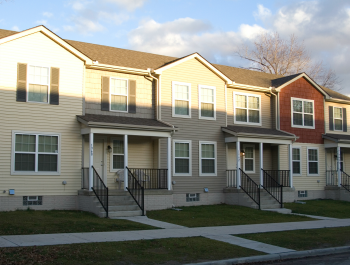
Timothy S. Thorland, executive director, Southwest Housing Solutions
Challenge: Southwest Detroit, MI, is one of the city’s most viable areas, but it still suffers from poverty, blight and disinvestment. The housing stock is generally weak and its quality is substandard. Nearly 30 percent of the homes are unoccupied and more than three-quarters of all the houses were built before 1959.
Southwest Detroit is an area about 14 square miles, home to about 90,000 people. It is the most diverse place in Michigan: About half the residents are Latino, a third are black and a fifth are white. More than 40 ethnicities are represented in the area.
Though it’s considered one of the most viable areas of the city, there are issues of poverty, blight and disinvestment. The housing stock in Southwest Detroit is generally weak and much of the quality is substandard. Nearly 30 percent of the 40,000 housing units are unoccupied and more than three-quarters of all the houses were built before 1959. Poverty, neglect and foreclosure have taken a punishing toll.
Despite these issues, the area has a rich ethnic, historical, and artistic tradition. Vernor Avenue, one of the major arteries, has been called the “city’s most viable commercial street,” and Mexicantown attracts a million visitors a year.
Southwest Solutions is leading a community revitalization strategy for Southwest Detroit that, 1) identifies and holistically addresses residents’ needs; 2) concentrates development on the two major corridors of West Vernor Highway and Michigan Avenue to create neighborhood activity centers, which serve as anchors for further development; and 3) engages residents in the decision-making about their neighborhood.
Southwest Solutions facilitates more than 50 programs in everything from counseling and wellness, to early childhood and education, to workforce development and homeownership. These programs help about 20,000 people a year, the majority of whom reside in Southwest Detroit.
On the community development side, our primary objectives include: affordable housing, elimination of blight conditions, preservation of historic properties, creation of attractive commercial space, and preservation of existing housing stock.
The combination of human services, community and economic development and resident engagement form the basis of our comprehensive and place-based investment strategy to help revitalize and improve the quality of life in Southwest Detroit.
Since 1998, Southwest Solutions has invested more than $100 million in Southwest Detroit, much of it around three nodes, or “Neighborhood Activity Centers,” that are essential to the area’s revitalization. Two of the centers are along West Vernor Highway -- the principal artery in Southwest Detroit. These centers draw businesses, service agencies, and other assets that attract residents and visitors and create a positive sense of community.

One of the Vernor Highway centers is in the Mexicantown area. Here, Southwest Solutions has rehabilitated a dozen apartment buildings that were once a blight on the area. The buildings now provide quality, affordable housing.
“I still have a hard time believing that we are here, in a place this nice, this comfortable, and this comforting,” says Bertha Huanosta, a tenant in an affordable townhouse developed by Southwest Solutions. “It’s really made a big difference for me and my kids. It feels like a new start in life, and I feel confident that we will make the best of it.”
Southwest Solutions has also built more than 150 units of new infill housing and repurposed three buildings key to the area’s resurgence: an abandoned, historic, structure known as Lithuanian Hall; the former St. Anthony’s church; and an abandoned police precinct building. These buildings now house organizations that make valuable contributions to the neighborhood.
This investment helped stabilize Mexicantown and has fostered its resurgence. New businesses, restaurants and nonprofit agencies have set up shop and new residents have moved in, all of which has caused a spike in property values.
Southwest Solutions learned valuable lessons from these efforts:
1. Evaluating the effectiveness of our strategy is difficult because of the number of variables. The staggering poverty rate in Southwest Detroit continues to increase and families that are upwardly mobile continue to leave the area, often due to issues of public safety, education, taxation and the cost of insurance in the area. These are sobering reminders that a true revitalization is still a long way away, and that the devastating effects of poverty and broken families are a profound challenge.
2. The successful rehabilitation of abandoned apartment buildings in Mexicantown has caused mixed reactions. As new residents have moved in, property values have risen, and city government has begun to operate more progressively, the concentration of these affordable apartment buildings has drawn some backlash. Some have even questioned the value and appropriateness of affordable housing in the area, citing issues caused by some of the tenants in these buildings. In fact, Southwest Solutions was forced to scale back some affordable housing projects in the area, and we have been forced to reassess how best to serve those without a voice in this community.

